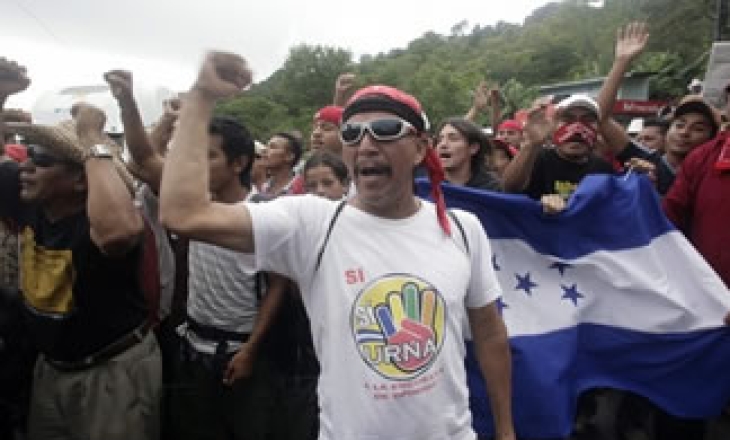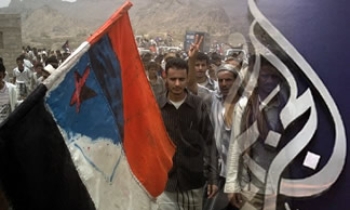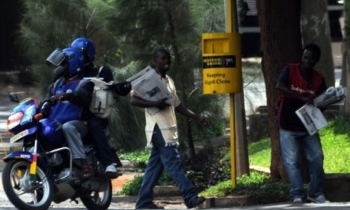The interim government in Honduras has been maintaining a selective censorship of news in the country since the June 28 coup d’état. Media regarded as critical of President Roberto Micheletti are being systematically obstructed.
The programming of Radio Globo, one of the few media still criticising the new regime, is often interrupted. Soldiers tried to force their way into its studios on July 25 before giving up because of opposition from demonstrators.
“Respect for basic freedoms, including freedom of the press, has been openly violated in the past month,” Reporters Sans Frontières (RSF) said. “By suspending or shutting down the operations of certain local and international broadcast media, those who staged the coup have shown they clearly want to cover up what is going on. We urge all sides to respect press freedom.”
A plain-clothes police officer opposed to the coup warned Radio Globo on July 25 of an imminent raid. According to Radio Globo owner Alejandro Villatoro, the head of the National Telecommunications Council (CONATEL) had been threatening since July 5 to seize the station’s equipment without offering any clear grounds. Because some 400 people rushed to defend the station on July 25, following the warning, the police finally backed down.
An ARTICLE 19 delegation, which recently returned from Honduras, reported serious abuses of human rights and freedom of expression in that country. ARTICLE 19 representatives met journalists, human rights defenders, NGOs, and officials to document their experiences of human rights abuses since the interim government under Roberto Micheletti was installed.
The first-hand testimonies of these people demonstrate a systemic pattern of violence and threats against journalists, media workers and human rights defenders, a highly polarised and divided media community, censorship by both State and non-State actors, and commercial pressures placed upon the pro-Manuel Zelaya camp, ARTICLE 19 said. The overall conditions for journalistic work and media reporting are deteriorating, while the number of social and political confrontations is increasing.
ARTICLE 19 found worrying evidence of increasing violence, perpetrated by both the military and pro-Zelaya demonstrators. Journalists and photographers have been attacked and had their material destroyed. Several radio and television stations have been closed down, or have experienced unexplained power cuts, signal blocking and interrupted phone lines, as well as threatening phone calls. Some commercial enterprises, including the Tigo cellphone company and the national bank FICOSA, have threatened to withdraw radio and television advertising from stations accused of openly supporting Zelaya.
Human rights defenders are under threats and intimidation, and unable to investigate and report on abuses of human rights abuses. Military road blocks and curfews prevent them from reaching the areas most at risk, where allegations of abuses have been made, while their access to the media to report on these abuses is sharply limited due to their perceived or real association with the pro-Zelaya camp.
“Simmering tensions, increasingly confrontational stands, polarised, manipulative and biased information, and censorship: the ingredients are all there for a major and bloody crisis to erupt in Honduras,” said Agnès Callamard, ARTICLE 19 Executive Director, who was part of the delegation visiting Honduras.
Coverage of what is going on in Honduras has been getting steadily scarcer ever since the coup, RSF said. A five-hour power outage that began minutes after the start of the coup silenced all the country’s radio and TV stations. Thereafter, news media regarded as hostile to the de facto regime began being subjected to a series of discriminatory measures.
Two journalists say that have been pressured by their own management. One of them, Allan Adális Martínez of Radio Alegre, was dismissed on July 15 for referring to President Manuel Zelaya’s ouster as a “coup d’état.”
Local broadcasting of international TV stations such as Telesur, Cubavisión Internacional and the Spanish-language version of CNN has been stopped. Eleven journalists employed by the Venezuelan TV stations Telesur and VTV were arrested on the night of July 12 and forced to leave the country.
The broadcasts of at least eight radio and TV stations have been interrupted for varying periods, sometimes for up to several days, in the course of the past month. In many of these cases, the interruption came after they broadcast pro-Zelaya reports. After they came back on the air, all content relating to the coup was closely controlled .










